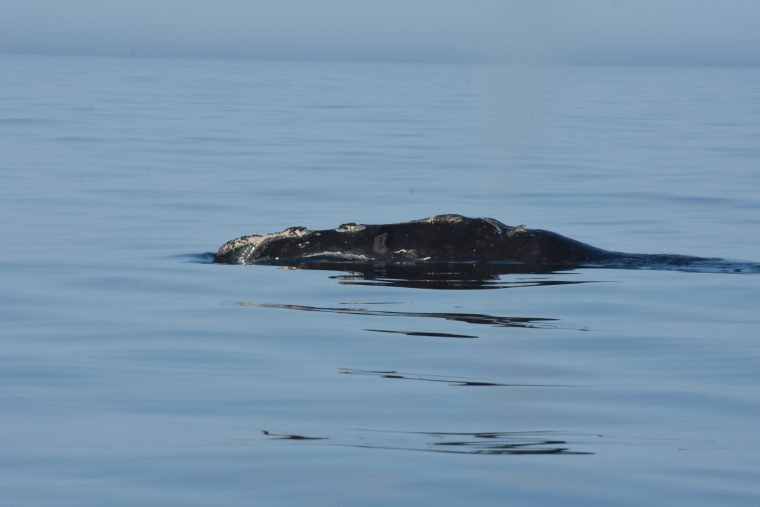Please note: We strongly recommend purchasing tickets online in advance to guarantee entry, as we do sell out on weekends.
“Snow Cone” gave birth to a calf last year while actively entangled in fishing gear; she was sighted last month without the calf

BOSTON, MASS. (Aug. 4, 2022) – Weeks after severely entangled North Atlantic right whale “Snow Cone” was sighted in Canadian waters without her 2022 calf, an analysis by New England Aquarium scientists has found the whale’s condition has worsened over the past three months.
“Snow Cone” (Catalog #3560), who in March 2021 was sighted with her fourth entanglement in fishing gear, drew extra attention in December 2021 when researchers in the right whale calving grounds off the southeastern U.S. sighted her with a newborn calf. Snow Cone was still entangled, with rope deeply embedded in her upper jaw. Given the severity of her entanglement, which likely impacts her ability to eat and migrate efficiently, scientists expressed concern about whether she could effectively nurse a calf through weaning, given the amount of energy it requires and her compromised state as a result of the entanglement. When Snow Cone was sighted in Cape Cod Bay in April, her body condition had declined markedly.
On July 23, a research team led by the Canadian Whale Institute, in collaboration with the New England Aquarium, sighted Snow Cone, still entangled and without her calf, while conducting field work in the Gulf of St. Lawrence, Canada. An analysis by Aquarium scientists determined her condition has worsened over the past three months: She remains thin and now has lesions on both of her lip lines that were not present in the springtime. Scientists cannot yet say with certainty what happened to Snow Cone’s calf, though researchers conducting field work are continuing to search by boat and plane.
“While whales like Snow Cone can swim with entangling gear and excruciating injuries for months and sometimes even years, it greatly diminishes their quality of life,” said Heather Pettis, Research Scientist in the New England Aquarium’s Anderson Cabot Center for Ocean Life. “Entanglements cause tremendous physiological stress and drain a whale’s energetic reserves to the point where reproduction ceases and, in these severe cases, eventual death is likely. Unfortunately, with her current entanglement, Snow Cone’s prognosis is poor. She and other right whales should be living much longer and healthier lives and not be subject to the frequent entanglements this species endures.”
Nearly 90% of all critically endangered North Atlantic right whales have suffered at least one entanglement event in their lifetime. Many of them have been entangled at least twice, and some up to eight times.
In March 2021, when Snow Cone was seen off Plymouth, MA, dragging hundreds of feet of thick, heavy fishing lines, a trained disentanglement team removed some of the rope, but not all. In May 2021, when seen in the Gulf of St. Lawrence, Canada, another disentanglement team tried to remove more rope, but still not all of it could be removed due to the embedded rope at the upper jaw. Then, Snow Cone was spotted in December 2021 with a newborn calf near Cumberland Island, Georgia. Researchers later sighted her in Cape Cod Bay in April, which was the last time scientists saw her 2022 calf.
Researchers with the Canadian Whale Institute, University of New Brunswick, and the New England Aquarium, as well as fishers from Fédération Régionale Acadienne des Pêcheurs Professionnels (FRAPP), are spending time aboard joint research cruises this summer in the Gulf of St. Lawrence, examining all aspects of right whale activity in the habitat. Their work includes gathering photo identification data, performing health assessments with images made via shipboard photographs and drone photography and videography, collecting skin biopsy and fecal samples for ongoing genetic and hormone studies, and also collecting oceanographic sample for assessing quality of the whales’ food resource. The Aquarium and the Canadian Whale Institute have conducted right whale research in the Gulf of St. Lawrence since 2006. Aquarium researchers are sharing regular updates about their time at sea via a live blog on neaq.org.
MEDIA CONTACT:
Pam Bechtold Snyder – psnyder@neaq.org, 617-686-5068
